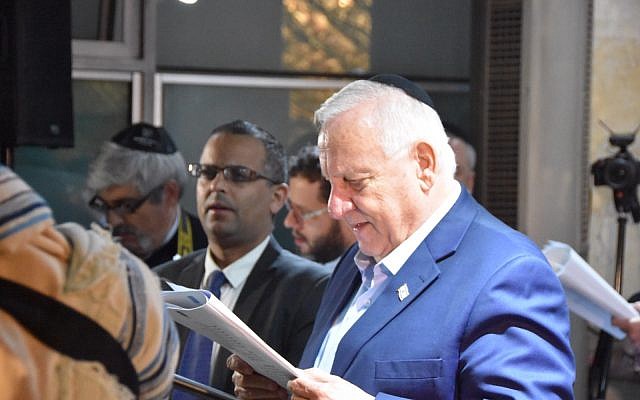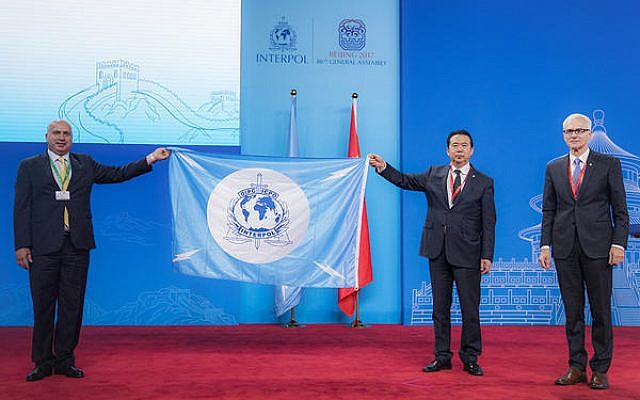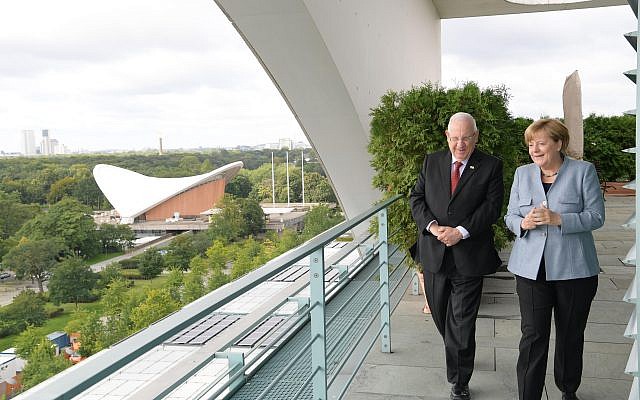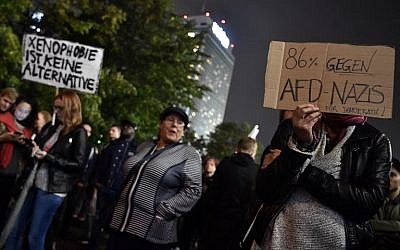President says world policing body’s ability to fight terror will be harmed, thanks Merkel for stance against AfD; US Jewish groups also slam Interpol move

President Reuven Rivlin on Wednesday criticized Interpol’s decision to admit the Palestinians as a member, saying it would weaken the global police body’s anti-terror capabilities.
“This decision will harm Interpol’s ability to fight international terror,” his office quoted him as saying a conference call with American Jewish leaders.
“This is not a decision based on professional need. It is absolutely a political decision,” he told members of the Conference of Presidents of Major American Jewish Organizations in a call to mark the Jewish high holidays.
Israel has lobbied against Palestinian efforts to join global organizations to advance their goal of statehood, and had claimed victory last year when a Palestinian bid to join Interpol was suspended.
In Jerusalem, Israeli Prime Minister Benjamin Netanyahu said the decision “seriously harms the chances to achieve peace.”
In a meeting with US Mideast envoy Jason Greenblatt, Netanyahu also said the “diplomatic warfare” carried out by the Palestinians will not go unanswered.
He did not elaborate. But earlier, Cabinet Minister Zeev Elkin, a close Netanyahu ally, said Israel should cancel gestures granted to the Palestinians, such as permits to work and enter Israel, and special travel permits for Palestinian leaders.
American Jewish groups also decried the decision.
The Anti-Defamation League it was “disappointed” and cited “legitimate concern expressed by Israel that the Palestinians could use their membership in Interpol to mount unwarranted legal challenges, including travel bans and extradition requests, against Israeli military and security officials.”
“Such action today by Interpol serves to encourage Palestinian rejectionism, and is only inimical to prospects for peace,” Bnai B’rith said in a statement.

Interpol on Wednesday approved the Palestinian application, along with a bid by the Solomon Islands, during its annual general assembly in Beijing.
The Palestine Liberation Organization’s negotiations affairs department said on Twitter that it had received more than 75 percent of the vote.
“Palestine’s membership is the outcome of members defending this organisation’s raison d’etre and advancing its core values, and a clear rejection of attempts at cynical manipulation and political bullying,” Palestinian foreign minister Riyad al-Malki said in a statement.
“It is very sad, that the Palestinians have been able to politicise another professional body, as part of their campaign to undermine peace talks and delegitimize Israel,” Rivlin said.
Palestine gained observer status at the United Nations in 2012 and since then has joined more than 50 international organisations and agreements, according to the Palestinian foreign ministry.
Among them are the International Criminal Court and UNESCO, the United Nations heritage body.
Interpol, which is based in the French city of Lyon, facilitates the exchange of information between police forces around the globe and issues “red notices” — non-binding notifications of arrest warrants — at the request of a member state or an international tribunal.
‘No place for AfD’s anti-Semitic voices’
Rivlin also addressed the recent rise to the German parliament of the far-right AfD party, praising Chancellor Angela Merkel for what he described as her “strong stand against the AfD and in the struggle against the neo-fascist trend that is raising its head throughout the world.”
“These anti-Semitic and racist voices have no place, either in Germany or anywhere else,” he added.
Rivlin met Merkel during a state visit to Germany earlier this month.

The AfD, derided by critics as anti-Semitic and racist, is the first openly anti-immigrant, far-right party to enter the Bundestag since World War II.
On Tuesday, Prime Minister Benjamin Netanyahu spoke with Merkel, who was reelected to lead the country for a fourth term, on the phone and discussed with her German-Israeli relations, including Jerusalem’s concerns about the rise of anti-Semitic elements within German politics. He called on the next German government to assume “historic responsibility” and reject efforts to deny or marginalize the Holocaust, but did not explicitly denounce the AfD.
“I called on the to-be-formed government to act in order to strengthen the forces in Germany that accept the historic responsibility,” he said, according to a somewhat cryptic readout of the conversation provided by the Prime Minister’s Office.

“Israel is worried about the rise of anti-Semitism in recent years among political elements on the right and on the left, as well as among Islamist elements.”
The Jewish state not only rejects Holocaust denial, but also any attempts to deny “responsibility,” the readout went, noting that the two were different things.
The comment on ostensible efforts to evade responsibility for the Holocaust may have been a reference to controversial statements made by AfD politicians.
In January, Thuringian AfD leader Björn Höcke derided the Berlin Holocaust memorial as a “monument of shame,” and called for a “180-degree reversal on the politics of remembrance.” National party leaders have sought to oust Höcke over those statements.
The Jewish community largely condemned the election victory of the far-right party, which garnered nearly 13 percent of the vote in Sunday’s national poll, making it the third-largest faction in parliament.
As reported by The Times of Israel
